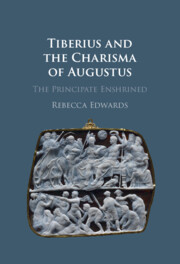Book contents
- Tiberius and the Charisma of Augustus
- Tiberius and the Charisma of Augustus
- Copyright page
- Contents
- Figures and Tables
- Acknowledgements
- Abbreviations
- Introduction
- Chapter 1 Augustan Charisma and Its Transfer
- Chapter 2 Tiberius and the Imperial Cult
- Chapter 3 Charismatic Precedents
- Chapter 4 The Power of Images of Augustus in the Age of Tiberius
- Chapter 5 Charismatic Images of Augustus in Tiberian Authors
- Chapter 6 Maiestas and the Protection of Augustan Charisma
- Conclusions
- Bibliography
- Index
Chapter 5 - Charismatic Images of Augustus in Tiberian Authors
Published online by Cambridge University Press: 28 November 2024
- Tiberius and the Charisma of Augustus
- Tiberius and the Charisma of Augustus
- Copyright page
- Contents
- Figures and Tables
- Acknowledgements
- Abbreviations
- Introduction
- Chapter 1 Augustan Charisma and Its Transfer
- Chapter 2 Tiberius and the Imperial Cult
- Chapter 3 Charismatic Precedents
- Chapter 4 The Power of Images of Augustus in the Age of Tiberius
- Chapter 5 Charismatic Images of Augustus in Tiberian Authors
- Chapter 6 Maiestas and the Protection of Augustan Charisma
- Conclusions
- Bibliography
- Index
Summary
In this chapter, we examine perceptions of the messages being sent by the court of Tiberius in the writings of contemporary authors. We begin with Ovid, exiled by Augustus and desperately trying to win his return. Ovid’s anger at being exiled is contrasted by his praise for the domus Augusta. We continue with the astrological works of Germanicus and Manilius, whose ambiguity conflates Divus Augustus with his living relatives. In Strabo’s Geography, we see that Augustus brought peace to the world, a peace continued by his son and grandsons. Velleius Paterculus gives us an eyewitness account of the transition of power between Augustus and Tiberius. In his account we perceive the threat of civil war had Divus Augustus not watched over his house and had Tiberius not taken up his father’s burden. Valerius Maximus presents the Caesars as epitomizing all of the noble exempla of the past. Phaedrus demonstrates the clear perception that Augustus was divine and Tiberius was mortal, although both men were wise. Finally, Seneca the Elder shows clear reverence for Augustus despite writing at the very end of Tiberius’ reign.
Keywords
- Type
- Chapter
- Information
- Tiberius and the Charisma of AugustusThe Principate Enshrined, pp. 135 - 165Publisher: Cambridge University PressPrint publication year: 2024

